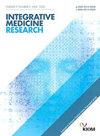Use and perception of generative artificial intelligence in traditional Korean medicine education: A cross-sectional survey of undergraduate students in Korea
IF 3
4区 医学
Q2 INTEGRATIVE & COMPLEMENTARY MEDICINE
引用次数: 0
Abstract
Background
This study aimed to examine the usage, awareness, and satisfaction related to generative AI (GenAI) among undergraduate students at a Traditional Korean Medicine (TKM) college in Korea and to identify factors associated with GenAI use and satisfaction.
Methods
A structured questionnaire consisting of 56 items across six domains was administered, covering demographics, general and TKM-specific GenAI use, satisfaction, educational experiences, and future expectations. Descriptive statistics, univariable analysis, multivariable logistic regression, and correlation analysis were performed.
Results
A total of 234 students across six academic years participated in the survey. Most respondents were aware of GenAI (88.5 %) and used it for general purposes (79.9 %). However, only 16.2 % actively used it for TKM learning. While 70.4 % were satisfied with using GenAI in general, only 45.8 % felt satisfied with its use for TKM education. Factors significantly associated with GenAI use or satisfaction included enrollment in the TKM curriculum, older age, prior major, scholarship receipt, and self-directed GenAI learning. Although only 18.8 % had experienced GenAI in formal TKM courses, 96.2 % viewed GenAI as necessary in TKM education.
Conclusion
A notable gap exists between students’ interest and the limited integration of GenAI in TKM curricula. To close this gap, GenAI should be systematically incorporated into educational programs, accompanied by faculty training and institutional support to enhance students’ digital readiness and learning outcomes.
生成式人工智能在韩国传统医学教育中的使用和感知:对韩国本科生的横断面调查
本研究旨在调查韩国一所传统韩国医学(TKM)学院本科生对生成式人工智能(GenAI)的使用、认知和满意度,并确定与GenAI使用和满意度相关的因素。方法采用6个领域的56项结构化问卷,涵盖人口统计、通用和tkm特定的GenAI使用、满意度、教育经历和未来期望。进行描述性统计、单变量分析、多变量logistic回归及相关分析。结果共有234名学生在6个学年参与了调查。大多数应答者(88.5%)知道GenAI,并将其用于一般用途(79.9%)。然而,只有16.2%的人积极地将其用于TKM学习。70.4%的人对GenAI的总体使用感到满意,而只有45.8%的人对其在TKM教育中的使用感到满意。与GenAI使用或满意度显著相关的因素包括TKM课程的注册、年龄、先前的专业、奖学金接收和自主GenAI学习。虽然只有18.8%的人在正式的TKM课程中经历过GenAI,但96.2%的人认为GenAI在TKM教育中是必要的。结论学生的兴趣与GenAI在TKM课程中的有限整合存在显著差距。为了缩小这一差距,应将GenAI系统地纳入教育计划,并辅以教师培训和机构支持,以提高学生的数字化准备和学习成果。
本文章由计算机程序翻译,如有差异,请以英文原文为准。
求助全文
约1分钟内获得全文
求助全文
来源期刊

Integrative Medicine Research
Medicine-Complementary and Alternative Medicine
CiteScore
6.50
自引率
2.90%
发文量
65
审稿时长
12 weeks
期刊介绍:
Integrative Medicine Research (IMR) is a quarterly, peer-reviewed journal focused on scientific research for integrative medicine including traditional medicine (emphasis on acupuncture and herbal medicine), complementary and alternative medicine, and systems medicine. The journal includes papers on basic research, clinical research, methodology, theory, computational analysis and modelling, topical reviews, medical history, education and policy based on physiology, pathology, diagnosis and the systems approach in the field of integrative medicine.
 求助内容:
求助内容: 应助结果提醒方式:
应助结果提醒方式:


